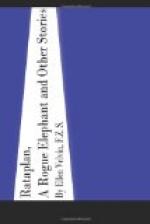Mona was deputed to stand in front of the parrots to take off their attention. He was told that this was not nearly so dangerous as pulling the feathers out, and so he believed what was told him, and did his best to attract the parrot’s attention, while his fellow-monkeys got behind and pulled out its feathers.
In doing this, careful as he was, poor Mona got some terrific pecks, one of which nearly blinded him; for a parrot’s beak can inflict a bad wound, especially if he is really angry.
As Mona did not get a single feather as a reward, he never again consented to attract a parrot’s attention while the others obtained their feast.
It was always the same; Mona never came to much harm, yet he was always unlucky.
Once he had really been very much in love with a little lady monkey of his own tribe, and for a time she had seemed very fond of him. But, alas, just as they were getting on so beautifully, the little lady monkey was killed in a quarrel, and poor Mona was left lonely once more.
Another time Mona was sitting on a branch of a tree, thinking about many sad things, when a little movement in front attracted his attention. In an instant his bright little eyes glanced down, and there, creeping slowly up the thick trunk of the tree, was a jaguar.
All the other monkeys were away; they had seen him long ago, but Mona had been dreaming.
With a shrill shriek of terror, Mona looked round for some way of escape, but there was none. To jump would be fatal; to stay where he was would be also fatal. And so Mona crouched down, crying so bitterly, and making such pathetic, little gestures of appeal that even the heart of a jaguar ought to have been touched.
But jaguars have very little heart, and they are extremely fond of monkeys; so, notwithstanding Mona’s little beseeching prayers, with one soft spring the jaguar leaped, and in a few moments Mona was no more.
His sad little life, with all its troubles and loneliness, was at an end, and there was not even one monkey to mourn for him.
“A very good thing,” the red monkey said, disdainfully. “I hated that Mona monkey. If it hadn’t been for him, I should have married the little white-nosed monkey; as it was, she ran away, and married one of her own tribe.”
[Illustration: MONA DID HIS BEST TO ATTRACT THE PARROT’S ATTENTION”]
“I always said,” the old mother monkey remarked, who had looked on at the death from a safe corner. “I always said that Mona was unlucky.”
“Yes,” jeered the red monkey, “but you also said that he would never come to much harm. And he was killed by a jaguar.”
“He never came to much harm in life,” the old mother monkey said, impressively; “but he died as a great many other monkeys do, a quick death. Far better that”—with a sad and somewhat grave shake of the head—” far better—far more happy—than to grow old and stiff and feeble. But I always liked Mona, and I am sorry that he is dead.”




